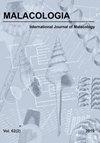Pronounced Mitochondrial DNA Population Genetic Structure in a Brooding Coastal Marine Invertebrate
IF 1
4区 生物学
Q4 ZOOLOGY
引用次数: 0
Abstract
ABSTRACT Analyses of phylogeographic and population genetic structure of marine species with large population sizes, low fecundity, larval brooding, and limited dispersal such as the New Zealand flat oyster, Ostrea chilensis Küster, 1844, permit testing of the effects of historical and contemporary processes affecting patterns of coastal genetic differentiation and diversity. Analyses of DNA sequences from two mitochondrial DNA regions (COI, Cyt-b) compiled from O. chilensis individuals from 14 localities revealed a pronounced structure with three genetic clusters [Hauraki Gulf (HG); North; South] being resolved. These results suggest that historical processes have contributed to patterns of regional separation that have in turn contributed to regional genetic differences that are still observable today. Divergence time estimates of HG from North+South (1.97 Ma) and of North from South (0.36 Ma) indicate that O. chilensis from these regions represent evolutionarily significant units that evolved separately and rapidly in the early to middle Pleistocene. Analyses revealed no obvious periods of population expansion within any of the regions. These results contribute to a better understanding of how historical factors can result in pronounced mitochondrial DNA patterns of contemporary genetic structure and show how key life-history characteristics, e.g., larval brooding, can contribute to phylogeographic structure in coastal marine invertebrates.一种正在孵化的沿海无脊椎动物线粒体DNA群体遗传结构
摘要对种群规模大、繁殖力低、幼虫孵化和扩散有限的海洋物种(如新西兰扁牡蛎、智利奥斯特牡蛎,1844)的系统地理和种群遗传结构进行分析,可以检验历史和当代过程对沿海遗传分化和多样性模式的影响。对来自14个地方的智利O.chilensis个体的两个线粒体DNA区域(COI,Cyt-b)的DNA序列进行分析,发现了一个明显的结构,其中三个遗传簇[豪拉基湾(HG);北部;南部]正在被解析。这些结果表明,历史过程促成了区域分离模式,而区域分离模式又促成了今天仍然可以观察到的区域遗传差异。HG从北+南(1.97 Ma)和北-南(0.36 Ma)的差异时间估计表明,这些地区的智利O.chilensis代表了在更新世早期至中期分别快速进化的进化重要单元。分析显示,任何一个地区都没有明显的人口扩张时期。这些结果有助于更好地理解历史因素如何导致当代遗传结构的明显线粒体DNA模式,并表明关键的生活史特征,如幼虫孵化,如何有助于沿海海洋无脊椎动物的系统地理结构。
本文章由计算机程序翻译,如有差异,请以英文原文为准。
求助全文
约1分钟内获得全文
求助全文
来源期刊

Malacologia
生物-动物学
CiteScore
2.00
自引率
0.00%
发文量
15
审稿时长
3 months
期刊介绍:
Malacologia publishes papers on all groups of the Mollusca. Malacologia specializes in publishing long papers and monographic treatments. Complete data are especially appreciated. Papers must be of interest to an international readership. Papers in systematics, ecology, population ecology, genetics, molecular genetics, evolution and phylogenetic treatments are especially welcomed. Also welcomed are letters to the editor involving papers published or issues of import to science of the day.
 求助内容:
求助内容: 应助结果提醒方式:
应助结果提醒方式:


